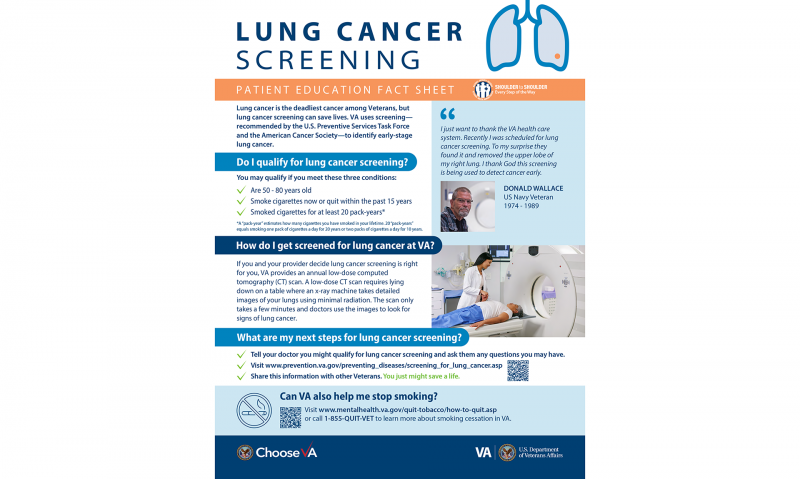
Lung cancer is the deadliest cancer among veterans, but the number of annual screenings is less than other cancer screenings.
November is Lung Cancer Awareness Month, and included in that is National Lung Cancer Screening Day on Nov. 11. Ahead of that, the U.S. Department of Veterans Affairs is urging veterans to get screened for what is the No. 1 cancer killer among veterans – and veterans are at twice the risk as non-veterans of developing lung cancer.
Veterans enrolled in the VA health-care system may qualify for lung cancer screening based on the following criteria:
· Are 50-80 years old, AND
· Smoke cigarettes now or quit within the past 15 years, AND
· Smoked cigarettes for at least 20 pack-years (a pack a day for 20 years or two packs a day for 10 years).
Pulmonologist Dr. Nichole Tanner is a member of the Multidisciplinary Thoracic Oncology Clinic (MTOC) at the Ralph H. Johnson VA Medical Center in Charleston VAMC. She was on the Ralph H. Johnson VAMC staff when in 2012 the center was selected as one of eight sites to be part of a demonstration project to assess what resources would be needed to have a lung cancer screening program within VA. The project lasted three years, and at the end of those three years, the medical center saw enough value in the program and its contributions to veteran health that the facility opted to continue the lung cancer screening program locally there.
Tanner spoke with American Legion Social Media Manager Steven B. Brooks about the importance of lung cancer screening among veterans and how veterans can go about getting screened.
Steven B. Brooks: Why is lung cancer screening something about which VA really feels it has to get the word out?
Nicole Tanner: The evidence (to support) lung cancer screening has been out and available since 2011. The uptake of lung cancer screening, unfortunately, has been low compared to other commonly screened for cancers, like breast cancer and colon cancer. If you look at the curve of the uptake for those cancer screenings when the recommendation was first there, the increase in uptake was quite quick. With lung cancer screening, really, the uptake across the United States … is approximately 14 percent of those eligible have been screened. So even though this is something that has been covered by Medicare and Medicaid since 2013, the uptake just hasn’t been there. So, we’re really trying to do our best to educate the public about lung cancer screening.
I think many people don’t realize lung cancer kills more Americans than breast, prostate and colon (cancer) combined every year. Everyone knows about (Breast Cancer Awareness Month) in October, but there just hasn’t been, I think, enough awareness about lung cancer screening.
Queston: As cancers go, it’s the deadliest among veterans as well, isn’t it?
Answer: It is definitely the deadliest among veterans. When you compare veterans to the general population, veterans are at a higher risk for lung cancer, a higher risk for death from lung cancer, for a number of reasons. No. 1, cigarettes were commonly given out in ration boxes back in the day. Now, we’re concerned about other exposures that are borne by military personnel that others might not have experienced.
Question: What’s the process for getting screened for lung cancer for a veteran? How do they go about doing that through the VA?
Answer: Through the VA it’s really easy. We always tell our patients that it’s important to talk to their providers. There are risks associated with lung screening, and there are certainly benefits. One of the important things is to have that discussion. The last thing we want is for someone to have a lung cancer screening exam and have a result and have anxiety around that result. It’s important to talk to your physicians about risks and benefits, and once a veteran decides it’s something they’d like to move forward with, it’s a very simple test. It’s a low-dose CT scan … we don’t use as much radiation as we do with a standard CT scan. They have you lay on a table, and then you go through an open loop. The whole scan takes less than a minute.
Question: What is National Lung Cancer Screening Day?
Answer: The American Cancer Society has partnered with a number of professional organizations and hospital systems, including the VA, to have National Lung Cancer Screening Day. Depending on where you live, there are different ways we are celebrating National Lung Cancer Screening Day. In some places, they are actually opening up the scanners and have as many people come in to get scanned that are eligible. They’re increasing awareness through different events.
Question: Is there anything else you feel needs to be known about lung cancer screening?
Answer: One of the big things I really want to emphasize is there’s a stigma associated with smoking cigarettes, and we really need to get away from that stigma and empower people to not feel embarrassed or feel like they deserve it because they had a bad health behavior. I think the reason the (screening) uptake has been so poor … is that this the first screening test where we’re targeting a health behavior. It’s not, “hey, you’re 45, go get your colonoscopy.” It’s, “Hey, you smoked cigarettes. Shame on you.” We don’t want to propagate that. No one is blaming anyone for this. We are really trying to push a screening behavior to save lives. No one’s judging.”
Veterans interested in getting a lung cancer screening should reach out to their local VA medical facility to see if any special screening events are scheduled. Find a VA facility here.
- Veterans Healthcare

